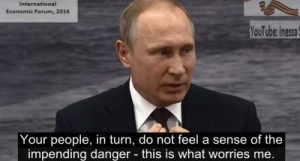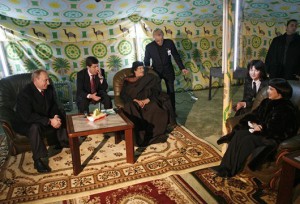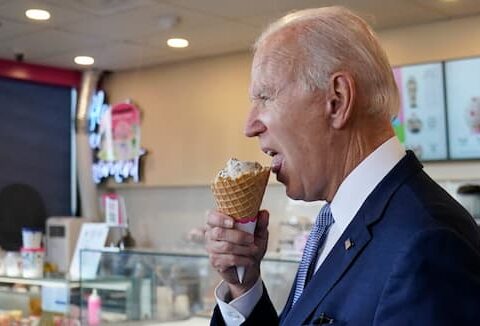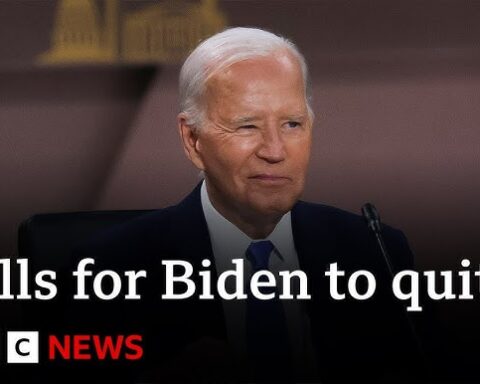This could actually be viewed as a follow-up to the post from a couple of weeks back on the Pentagon‘s ‘Nuclear Posture Review’ and the threat of another Hiroshima-like event in our lifetimes.
In that instance, I was highlighting the insanity of what the NPR proposed and noting the very worrying change in language concerning nuclear weapons.
A lot of attention has been paid to Vladimir Putin’s state of the nation address on Wednesday, which has been construed by most Western media as having been overtly threatening. In part of the speech, Putin announced the existence of Russia’s new, expanded nuclear weapons and capabilities, suggesting that Russia now has superior nuclear capabilities to the United States and NATO and is perfectly capable of handling any attack against it.
Most of the media treated Putin’s announcements as a direct threat against the West. The Guardian went with the headline “Putin threatens US arms race with new missiles declaration”.
This widespread coverage, for the most part, was missing the point entirely (and deliberately).
Whether Putin’s claims about Russian strategic and nuclear capacities are entirely true or whether he was just saber-rattling is something I wouldn’t know.
But the point is, firstly, that Putin was largely responding to statements and policy changes that have been made by the Pentagon and the US military-industrial complex in recent weeks (in particular, the details of the Nuclear Posture Review that I covered here a few weeks ago); and, secondly, that Putin framed most of this address in the context of wanting the United States and the West to avoid conflict or escalation and move towards more diplomatic activity.
On the first point, as I wrote a couple of weeks ago, the NPR was a highly worrying and very threatening document, which marked a conscious shift in language and policy regarding nuclear weapons and which was basically advocating pre-emptive or ‘first use’ nuclear strikes by the United States (extraordinarily, this even included as a response to non-nuclear threats such as a cyber attack).
Given that Russia was clearly implied as a potential target in such a scenario, it is no mystery why Putin has come back with this kind of posturing.
Whether the NPR was intended merely as a mixture of saber-rattling and warning – and whether, likewise, Putin’s statements on Wednesday are meant as the same – I don’t know: I assume neither Russia’s or the United States’ leadership has any intention of *actual* nuclear war.
I acknowledge too that my assumption might be naive.
Putin’s announcements in fact are wholly in-line with what the whole point (and prevailing philosophy) of nuclear weapons was meant to be for decades: specifically, that they are intended as deterrants. Clearly, Putin’s address went in this direction precisely because he is trying to deter the US and NATO from pursuing any foolish policies or escalating things too far.

Putin’s position is therefore the sane one and the one that is in keeping with all the justifications for nuclear weapons that pro-nuclear countries – including the United States – were citing for decades.
By comparison, the NPR seemed to do away with that long-established philosophy entirely and advocated pre-emptive or ‘first use’ nuclear strikes. And yet, as noted then, the media paid virtually no attention at all to the NPR – it certainly didn’t raise alarm bells or ask moral questions. And yet Putin’s address is being spun as the Russian leader making nuclear threats against the West – which, in essence, he is; but there is context and nuance to all of this that most media coverage is choosing not to take note of.
And, again, the other point is that Putin’s statement was clearly intended as a warning and even a call to diplomacy: in the speech, he stressed the point that Russia would not have needed to roll out all these new weapons and systems had the US and its allies not continued its provocations and had it not continued to ignore all of Russia’s attempts at diplomacy.
These latest statements also need to be seen in context of previous addresses, both in Russia and at the UN: Putin has been entirely consistent in that respect, with previous warnings having been made – in clear language – about US threats and provocations and about Western regime-change operations and interventions in the Middle East that had illegally overthrown soveriegn states and created the massive spread of terrorism and jihadism and massively jeapordised the security of multiple nations.
“Nobody wanted to talk with us on the core of the problem. Nobody listened to us,” Putin said on Wednesday. “Now you listen!”
It does sound threatening, right? But it isn’t Putin or Russia that is talking about ‘first use’ options or pre-emptive strikes. And we should note that it was also reported a few weeks ago (by the highly respected Consortium News, for example), that Russians were genuinely “spooked” by the Pentagon’s NPR document and its dramatic shift in language and policy that seemed to be advocating pre-emptive nuclear strikes.
It wouldn’t surprise me that Putin is trying to stand up directly to that threat: either by warning the US that Russia’s nuclear capabilities would mean a great deal of mutual destruction or by trying to frighten US policy-makers away from the ideas laid out in the NPR.

The indications in prior weeks were also that Russians were worried about the specific NPR reference to a nuclear response to a cyber attack: particularly becuase Russia is involved in ‘cyber warfare’ (as is the United States) and is frequently accused by the US and the West of cyber-related crimes. The Consortium piece highlights Russian anxieties about possible ‘false-flags’ involving cyber warfare that could be blamed on Russia.
Given the highly dubious official story of the MH-17 tragedy (see here), the idea of a false-flag to justify extreme action against Russia isn’t necessarily far-fetched.
The real danger now is that the Pentagon’s NPR ‘lowering of the threshold for employing nuclear weapons’ means, in theory, that a nuclear attack (and nuclear war) could erupt over things that have never before been considered grounds for so extreme an action.
In essence, as I said in the article on the NPR, the Pentagon’s newly-reconfigured policy is *actually* insane: and is a total departure from decades of established or accepted ‘wisdom’ (I use that word loosely) regarding nuclear weapons, which were supposedly all about detterance and about maintaining a ‘balance of power’ by the threat of mutually-assured destruction, ensuring that such mass-destructive weapons would never be used pre-emptively.
But, as noted at the time, there was virtual media silence on the subject: whereas, the same outlets have been much more attentive to Putin’s address on Wednesday, as if Putin is just saying all this stuff out of sheer super-villaininess.
Also, on February 21st, the UK’s Minister of Defence, Gavin Williamson, announced that Britain is changing its core defence strategy from one that’s focused on threats posed by non-state terrorists (like the Islamic State group) to one that’s targeted instead against three countries: Russia, China and North Korea. He suggested that the massive increase in military spending that will be needed will have to be drawn from other areas of government spending, including anti-terrorist operations and even health services.
The headline in The Times: “Russia ‘is a bigger threat to our security than terrorists'”.
It wasn’t clear, however, what the perceived threat was: whether it was military or whether it was a reference to cyber attacks.
I don’t often mention it here, but there is also a school of thought in conspiracy-theory circles that the entire Russia/United-States enmity thing isn’t actual real, but is a kind of staged scenario played out with Putin as ‘controlled opposition’ – the purpose, I guess, being to maintain artificial conflict and mutual ‘threat’ (to keep each respective establishment in power and able to justify their respective military budgets) and to bring the global situation to some specific, planned point of crisis.
A blogger friend of mine is adamant about this being the case: I don’t subscribe to that theory, however. All of the Russia-related provocation, tension, military manuevering and propaganda of the last several years seems entirely real to me.
Although, in fairness to that theory, it does seem unthinkable that either the United States or Russia would actually nuke each other (if they didn’t do so in the entirety of the Cold War, would either of them really resort to it now?): which would, I guess, suggest all of this might be pantomime.
But I’m still not convinced.
For the record, I am not a Putin apologist or an apologist for Russia. There’s a lot I don’t like about Russia in terms of domestic Russian politics. And I don’t view Russia as a real democracy (the way I’ve had it put to me by some Russians is “an emerging democracy”).
And I also don’t deny that there is a genuinely felt (and legitimate) fear of Russia in certain parts of Europe, like Estonia and Latvia, where populations have very real and very bad memories of being under Soviet occupation and of Russian domination. I have a very close friend who now lives in Estonia, and he tells me that most of the people he knows there are always worried about Russia one day invading – and these basic fears from normal people are deep-seated and pre-date any US or NATO-based propaganda campaign to amplify or incite fear of Russia (which also is going on – but it is playing on strongly-held fears that were already genuinely there).
But, in the current state of affairs (and I’m only addressing the current state of affairs), it is not Russia that has been making the threats.
In fact, Russia has been far more disposed towards diplomacy, peace-seeking solutions and reconciliation than the United States or most of the NATO countries have been.
And when we look at Putin’s nuclear posturing (which, again, was directly in response to the Pentagon’s nuclear posturing), we should also understand that the Russian government has made lots of efforts in the passed several years to establish positive relations with the United States.
And the overriding and broader dynamic of how Russia is portrayed and treated by the United States and the West is encapsulated entirely in the dynamics of how Russia’s involvement in Syria has been portrayed.
While Western coverage of Syria generally portrays the moral bankruptcy of Russia’s military intervention for the sake of a ‘brutal dictator’ and the barbarity of its indiscriminate bombing of, say, Aleppo (no different to the United States’ bombing of, say, Mosul, in terms of civilian casualties and damage), it never acknowledges the amount of times – prior to its military intervention – that Russia tried to broker a settlement in Syria or act as a middleman for a diplomatic solution to the crisis.
Russia waited years before it went into Syria militarily, all the while it was desperately scrambling around to enourage or arrange diplomatic solutions and even trying to steer the United States away from another failed regime-change or another collapse of a sovereign state.
This was also the case in Libya, where – despite its opposition to the NATO intervention – Russia stayed out of it and seemed to be giving France, Britain, the United States and co the benefit of the doubt, despite mounting suspicions that the NATO powers were trying to assassinate Libya’s leader and force a regime change.

Contrary to some perceptions, Putin’s main interest in Syria is not simply to prop up the Assad regime or family: but to prevent another collapsed state and avoid another Libya or Iraq (Russia also has strategic interests, of course, but that’s by-the-by).
For years prior to any Russian military intervention, the Russians appeared to be the only grown-ups in the room.
That very much seems to be carrying over into this heightened nuclear threat business too.
As with Syria – where Russian officials spent years trying to find non-military solutions and trying to encourage diplomacy – the Russian leadership is still constantly calling for diplomacy, normalisation, reconciliation and a backing-away from provocations. The threats made by Putin on Wednesday were entirely deterrant in nature, so as to encourage a renewed focus on diplomacy and sane relationships between so-called ‘super-power’ countries (and to give credit to Donald Trump, he appeared to be desirous of this too, at least in regard to Russia specifically – though not China).
The reason I highlight all of this is because, just as Russia eventually went into Syria militarily (after years of failed diplomacy), Russia will likely eventually do whatever it has to do to protect itself when all attempts at diplomacy and normal relations fail – even if the US was to ever try to follow-through on the daft ideas laid out in the NPR.
And that seems, essentially, to be what Putin was saying in his address: let’s talk, let’s be grown-ups, let’s not do anything crazy – but be warned that we have big weapons too.
So, now that the Pentagon has done its very worrying posturing and Putin and Russia have done their counter-posturing, let’s hope all parties are sufficiently startled enough to bring their minds away from weapons of mass destruction and towards diplomacy and peace-solutions instead. If there’s one thing President Trump was right about (and it’s probably only one thing), it’s that the United States and Russia need to step back from provocations and start talking like grown-ups.
The alternatives are too stupid, and too dangerous, to think about.
Read more: ‘In the Hands of Madmen: Another Hiroshima & a Silent Media‘, ‘Saudi Arabia, Iran & the Middle East Conflict Going Nuclear‘, ‘Hiroshima and the Destroyer of Worlds: Was it Justified?‘, ‘Is a North Korea False-Flag Imminent…?‘ ‘MH-17: What Really Happened…?‘





Good analysis. We think that Russia is a player in the Middle East that works for stability and peace. Things that both Israel and the US do not want as indicated by their policies and actions to date.
As to Putin’s address this past week, he is also making the case that, like it or not, the West needs to take Russia seriously and recognize that Russia is not going to sit back and allow NATO to push it around. From a Russian nationalist perspective, this is quite sensible. Putin is very bright and he has a longer view or greater attention span than most politicos in the West. We in the West need to oppose this Anglo-American Zionist war machine that seeks to vilify Russia. There is no need to make an enemy of Russia.
The reserve currency is the big difference. This is illustrated by Stalins death after having refused to accept the hegemonic nature of the Bretton Woods embarking instead on their own goldbacked rouble and inviting independent capitalist nation to join their new trade zone.
After his death Churchill suddenly accepted the order of garters that he had refused after ‘winning WW2’. With Stalin gone it appears Churchill suddenly felt his mission was accomplished.
Chrustiev dropped the idea of challenging the dollar. That meant angloamerican dominance was secured.
But if one wants to seek conspiracies why not look for secret deals within the west. The Europeans the Soviets and Japan are believed by some to have intended to challenge the dollar with their own petrocurrency but after the Iranian revolution the plans seemed to have been mothballed. Or was it all a lie? My thought was that maybe Japan and France and Germany got an offer from the Us and therefore changed their minds.
What offer would be better than to get a share of americas gains from the reserve currency?
Before the existence of the ECB things had already evolved along such lines. The original Bretton Woods had dollar and pounds as the only reserve currencies at a ratio of 20 to 1. But later Europe (supposedly Westgermany and France) and Japan entered the currency basket. I think that happened piecewise in particular after Nixon removed goldbacking and around the time of the so called oilcrisis in 1973 which was entirely a design by the angloamericans. At that time the Soviets got an influx of both high technology and grain from the US, which looks like a bilateral act to keep the Soviets happy (and also shutting their mouths about the Apollo project).
Since the deal between the Soviets and Westgermany in 1978 and the new attempt for a European petrocurrency depending also on a new relation with Opec with Japan involved seems to have come to nothing, we may speculate that there was a new element added to american offers. Such as what? Partnership in the FED? I once briefly spotted info about Japanese and German banks having some degree of control over the FED. Maybe this is not a big deal since I have little understanding of that subject.
But if this is important and partly withheld from the public it would explain why everybody seems to be so aligned with the US. I am fumbling in the dark here. Anyway after the emergence of the ECB things became even more complicated. Was it after that that the above foreign control of the FED happened? Or was it disinfo?
In any case the details about interrelations within moneypower may be important missing links for interpretating the world events.
Thanks Peter – you always bring so much more to the table.
You’re right of course that money-power has to be much more central/key to everything than we often account for.
Unfortunately, economics is not my personal strong-point.
I have, however, over the years wondered if a lot of the conflict we see (as in ‘cold’ conflict and not actual military engagement) is staged, while in reality all the involved powers are getting some mutual benefit from the pantomime, while only the little countries (the proxies or chosen battlefields like Vietnam, Syria, Libya, Iraq, Yemen, etc) ever actually get laid to waste.
Russia looks top enough and defence. US and co. obv. way more expensive gear but costly over-reach. What gives? Latest Su-57 fly-out got The Saker and comments discuss nuts and bolts. Bar, could-be US-based secret tech, no block with seeming advantage. Not convinced about nuclear but this irrelevant. Minimal capacity would crash economies. All that’s needed to devastate society. Leave us all going DIY-destruct. Much depends on new world order-ing. Right to ask and competition or collaboration? With possible bash-out once the collapse. A bit like Commies and Anarchos, who for now, somewhat stand together. Actually, in the UK and recent years, more-so. Lest we forget though, post-Rev. intend a fight to the death. A world run which way? By whom, or by no govt. On Russia? Can’t shake off the pesky line suggesting they’ve all the secrets c/o Tel Aviv tech dominance. And blackmail. This would need leadership acting-skills and outwork hard to square. Then we’ve US nationalist come, Globalist dreamers, wanting glory or death. Know Prison only a few, easy to prove, corruption charges away. Rather and if can, escalate a regional/worldwide conflict? For no more, than deflecting these woes. While some should know-what commentators, talking about soon come US military tribunals. Battling coup/s and civil-type wars. And/or always the suspected trillionaire-families that run the runners. Bunkered up, able and ready, for their reboot. Likely, eyes for utopia, most dangerous. Pragmatic roll-on squeeze, push, slow, slow, decline — the favoured alternative. Your, to and fro, right to balance and pause article, sets out the landscape. An ominous headline on to about as encouraging as we can be. As for the slacking, lacking, supposed pro-journalists? Shame on. Thanks for the replacement.
Mark, relating to what you’re saying, I’ve seen things here and there about these new mega-cities or highly advanced ‘capitals’ that are being built in very strange places like Azerbaijan and Kazakhstan. Makes me wonder where the funding is coming from and what the purpose of these new cities are in obscure places where the media pays no attention.
I sometimes wonder if it’s like they’ve already started building the major cities or center of the *next* world order, should it be that some catastrophe hits the current major cities or power-centres.
Excellent piece. And I have no doubt that the ‘great powers grand alliance conspiracy’ (to give it a name) is a total fantasy. Were a single powerful and homogenous group to literally pull all the strings both west and east, their cover would be blown by now. For how long could the money trails be hidden? And why have no serious researchers ever got near to the exposure of such an audacious scam? War and imperialist conquest is certainly a racket of course, but it is better to think in terms of ‘The Godfather’: a bunch of feuding dynasties divvying up the world’s resources while maintaining a fragile peace based on mutual self-interest and occasional secret round-table negotiations.
Thanks, WoC. Yeah, I’m mostly doubtful about that theory too – though i can see why some people think it to be the case.
By the way, I just read your interview on Oneness of Humanity a couple of days ago – it was a great read.
Thank you.